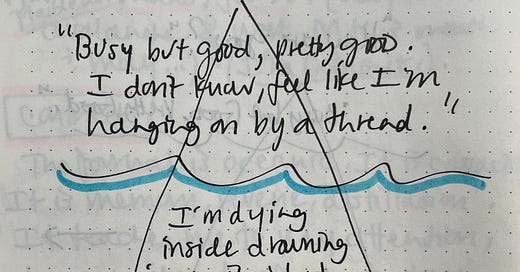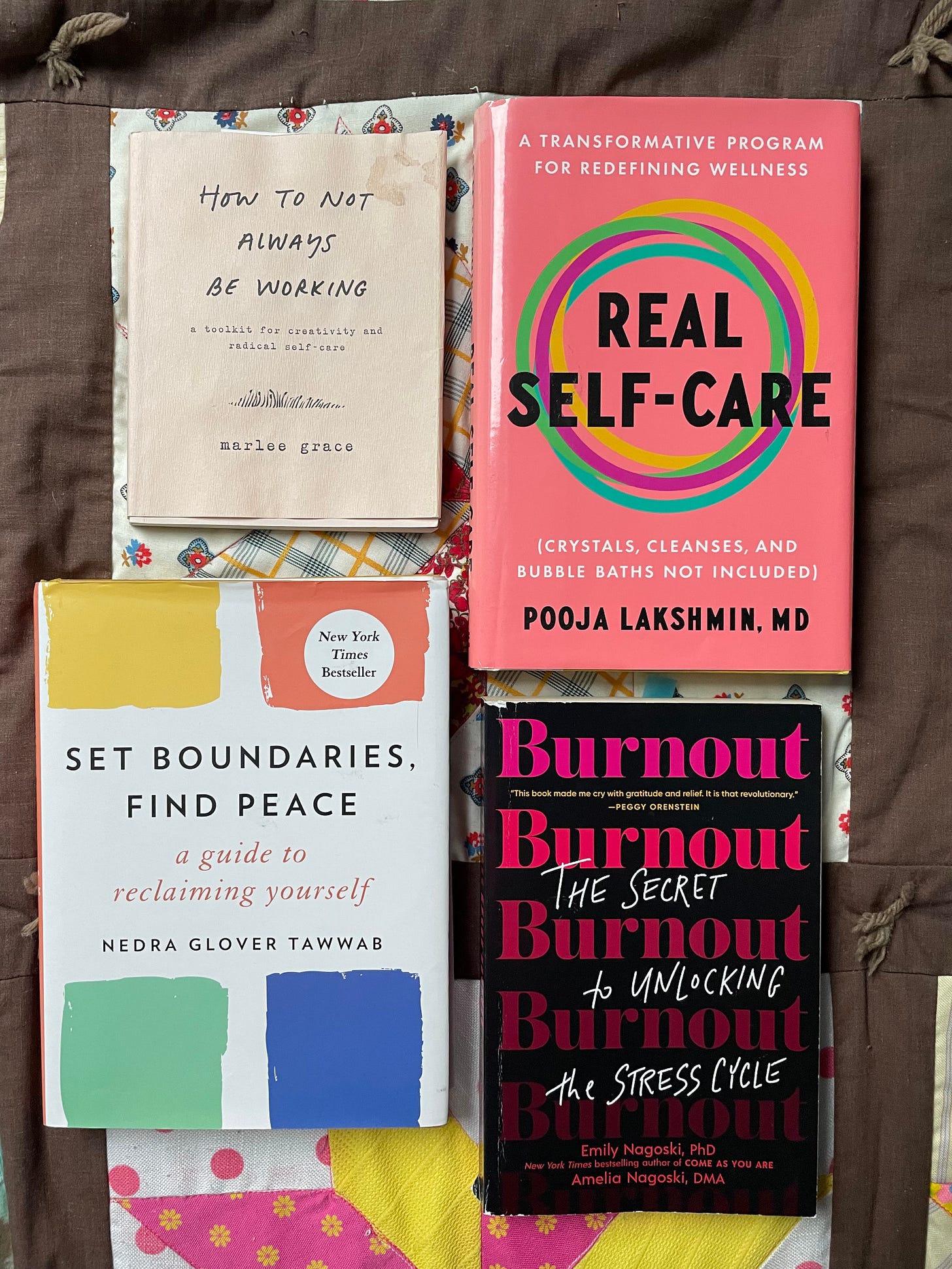Last week, I wrote a piece about Annie Dillard’s writing advice to “spend it all” and Jenny Odell’s conception of time as beans and it felt true. I realized later that it was only part of the story. Here’s the sequel.
Annie Dillard writes, “Anything you do not give freely and abundantly becomes lost to you. You open your safe and find ashes.”
But what about when you are continually expected to give your time and energy, and you simply don’t have any more left? What then?
Dillard, remember, is writing about writing. She’s writing about using your good ideas now, trusting that more will follow – having an abundance mindset rather than a scarcity mindset regarding one’s own ideas and creativity. Odell is focused on time and making the argument that, in fact, time is not a commodity. Time is beans, and therefore, it can be planted and you can grow more: “...time was not the currency of a zero-sum game and that, sometimes, the best way for me to get more time would be to give it to you, and the best way for you to get some would be to give it back to me. If time were not a commodity, then time, our time, would not be as scarce as it seemed just a moment ago. Together, we could have all the time in the world.”
What about when you have no capacity left to plant any more beans, and there’s no one around who has been planting them for you? (I’m collapsing ideas & time together, yes, and it’s oversimplified in a way, but stay with me). What about when you’ve been eating the last of the proverbial beans while rushing to pick up your kid from practice and filling out a googleform to register for a conference before the deadline? What about when time IS structured and honored as a commodity and you are on the clock and just need to keep your job? When you’re standing in the wasteland of your own energy and yet people don’t just want more, but need more?
It’s often impossible to say, “Nope, sorry, I can’t do it.” To lay down in the middle of the action and simply refuse. Children need fed and showered and helped with their homework. Whatever is going on with you is not as important—come on, you can dig deeper for more.
I am a recovering workaholic perfectionist and I am a mother, writer, teacher, spouse, daughter, friend, etc. And, more often than not, even in the midst of a bad migraine at the end of a long day, I will still dig for more. Will still assume that there IS more to find down there in the inner ash field to draw on so that I can do the bedtime routine, wash dishes, fold the laundry (or move it back from the bed to wrinkle further in the laundry basket for another day). Or, to write the words for the deadline, to comment on the essays, etc etc. But seriously, what about when you can’t—you just actually really CANNOT?
Sad truth: The only time I really stop is when I have a debilitating migraine or I’m very sick with a high fever or vomiting.
Last week I wrote, “But maybe digging deep for the energy to plant more really will yield something beautiful, something that I can’t yet know.” Maybe, if you’re Anne of Green Gables (my first childhood literary hero) and you can recast everything with a romantic gaze and convince yourself that’s the only story. I have that capacity sometimes and it is quite useful.
I wrote about how I “contract when I’m afraid or exhausted or unsure about how to move forward. I turn inward to protect whatever time or energy or resources I’ve got because I’m afraid I’ll run out entirely.” Guess what, sometimes this is exactly the right thing to do! Even when you’re NOT sick! Maybe even when you have a little energy left but you need or want to do something else with it.
A few years ago, by accident, I started on a meandering journey to learn how to fight my workaholism and try to be more healthy. This coincided with starting to journal and meditate regularly, and I’m sure that these practices primed me to realize I was, in fact, beyond burned out and needed to change something.
I think the first spark was following The Nap Ministry on IG, and being moved by Tricia Hersey’s book Rest is Resistance. Then my friend, Hana, sent me Marlee Grace’s book How to Not Always Be Working, and I learned to reflect on what was work and what wasn’t work, and how to create more time to not work (difficult to do esp when “work” is so invisible and ubiquitous and inside my phone, which is always with me). Then, in the midst of the pandemic and virtual/hybrid teaching hell, I read Emily and Amelia Nagoski’s Burnout: The Secret to Unlocking the Stress Cycle and I was struck by what they call “Human Giver Syndrome,” defined by philosopher, Kate Manne in her book, Down Girl, as “a condition in which some people (women, femmes, people of color) are expected to offer their time, attention, affection, and bodies willingly, placidly, to the other class of people, the ‘human beings.’” I realized that I have to complete the stress cycle every day in order to take care of myself, which for me, means exercising, writing, meditating even just five minutes, connecting with people I love, crying, etc.
Before I knew it, I was taking a class of my own creation called “How to Survive as a 21st century Workaholic with Human Giver Syndrome.” I read and loved Anne Helen Petersen’s Can’t Even and Pooja Lakshmin’s Real Self-Care and Nedra Glover Tawwab’s Set Boundaries, Find Peace.
These books and ideas have changed me, but I still struggle. In fact, I woke up today with a start, rattling off a list of deadlines and pounded downstairs wanting to get a jump on my work before my family woke up. So, yeah.
Jenny Odell writes in Saving Time, “Productivity is not the ultimate measure of the meaning or value of time.” YES. I know that is true in my head, but my actions do not back that up.
When it comes to writing and life, sometimes I need to say, NO. I don’t need to submit my writing for that contest if it means I’m acting like I’m a machine rather than a human being who has no need to rest. I’m going to keep that idea in my head in the shower and then turn it over and around while I go for a walk, and if I lose it, that’s ok. I don’t need to say yes to going on a hike with my family if what I really need is to be alone for a little while. I can ask for help. I can ask for help even before I’m ready to scream or pass out from exhaustion. Sometimes, I do.
I’m thinking now, too, of Amanda Montei’s new book, Touched Out, which just arrived yesterday and I can’t wait to read. Here are two recent interviews with Montei that I loved: one at Write More and one at Culture Study. Just one part of the Culture Study interview that resonates for me is how Montei talks about the way society begs women to “self-annihilate, lest they damage their kids forever— and that often gets deployed as a pat excuse for every way mothers are asked to disappear themselves in the early years of parenthood.”
Pooja Lakshmin’s first principle of Real Self-Care is: “You must be assertive in prioritizing your own needs and desires. To do that, you must learn to say no and to set boundaries. This often means balancing the needs of people close to you, like your partner’s preference or your children’s needs, with your own desires and needs. In this process, you must learn to stop being controlled by feelings of guilt, which are inevitable but can be managed” (70).
The guilt piece! If I say no, I will need to manage my guilt. But, I manage my guilt all the time anyway. What’s a little more?
While I’m resting or just not talking to anyone (sometimes what I most desperately need), my energy stores will start to reset again. I will come back from the brink of self-annihilation. Not from giving more, but from giving LESS for a while. From saying NO.
Like Matt Haig says, “No is a good word. It keeps you sane. In an age of overload no is really yes. It is yes to having the space you need to live.”
I’m thinking this morning about this Jack Gilbert poem, “Tear It Down.” I usually read this poem as a romantic love poem. But it also speaks to me as a poem about loving your life enough to tear it down and build something better.
We find out the heart only by dismantling what
the heart knows. By redefining the morning,
we find a morning that comes just after darkness.
We can break through marriage into marriage.
By insisting on love we spoil it, get beyond
affection and wade mouth-deep into love.
We must unlearn the constellations to see the stars.
But going back toward childhood will not help.
The village is not better than Pittsburgh.
Only Pittsburgh is more than Pittsburgh.
Rome is better than Rome in the same way the sound
of racoon tongues licking the inside walls
of the garbage tub is more than the stir
of them in the muck of the garbage. Love is not
enough. We die and are put into the earth forever.
We should insist while there is still time. We must
eat through the wildness of her sweet body already
in our bed to reach the body within the body.—Jack Gilbert, from The Great Fires: Poems 1982-1992, 2001 (Alfred A. Knopf)
I don’t want to reach the body within my body to find ashes. I want to save and cultivate my wildness. I want to save some for myself, not only because when I do that, I have more to give to others, but because when I care for myself, I can write what I’m meant to write. I can live the life I’m meant to live. I can be who I’m meant to be.
We should insist while there is still time.
Be Where You Are is a newsletter about how to use writing and mindfulness to be where you are. I’ll be back on Thursday with a prompt, and soon, another interview.
You’re always welcome to reply to this email, comment below, or find me on instagram (@mohnslate) or elsewhere. If you enjoyed this, I’d love it if you would subscribe, share this post, or send it to a friend.






All I can say is yes, yes, yes. I don't have young children, and am retired, but I still feel guilty if I want to just read, or take a walk, instead of working on poems or essays, putting away laundry, etc. I think you have captured what so many women feel. Thank you my friend, for writing these words.
You've written my biography, including debilitating migraines. At 84 I'm still learning to say NO. Thanks!